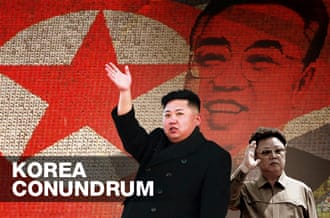North Korea admits failed rocket launch
![]()
State news agency says scientists investigating what went wrong after reports rocket broke up minutes after blast-off 
North Korea’s official news agency KCNA confirmed the rocket launch was a failure
A North Korean rocket launch has been confirmed as a “failure”, the country’s official news agency said, confirming earlier reports by neighbouring countries.
North Korea said on Friday that a satellite carried by the rocket launched earlier in the day did not enter orbit.
“The earth observation satellite failed to enter its preset orbit. Scientists, technicians and experts are now looking into the cause of the failure,” North Korea’s official KCNA news agency reported.
Kim Sung-hwan, South Korea’s foreign minister, had earlier told journalists that the rocket disintegrated a few minutes after lift-off, losing altitude and showering debris into the ocean.
A South Korean defence ministry spokesman told reporters the rocket had been launched at 7:39am local time on Friday (2239 GMT on Thursday).
“In terms of what exactly happened, South Korea’s defence ministry has given us what could be the clearest appreciation so far,” Al Jazeera’s Harry Fawcett reported from the South Korean capital Seoul.
“They say it hit a maximum height of 151km before they believe it blew up and came into the sea in some 20 pieces off the coast of the Korean peninsula about 100 – 150 km away,” he said.
North Korea had said the rocket was aimed at putting a satellite in orbit for peaceful research purposes, but Western critics said the launch amounted to a disguised ballistic missile test, banned by United Nations resolutions.
“North Korea’s launch… is a clear breach of the UN resolution that prohibits any launch using ballistic missile technology. It is a provocative act threatening peace and security on the Korean peninsula and Northeast Asia,” South Korea’s Kim said.
Friday’s blast-off marked the fourth failed rocket launch for North Korea so far, after its previous attempts in 1998, 2006 and 2009.
Military provocation
North Korea could stage military provocation against the South following its failed launch, a senior South Korean defence ministry official told a parliamentary hearing in Seoul on Friday.
“The possibility of an additional long-range rocket launch or a nuclear test, as well as a military provocation to strengthen internal solidarity is very high,” the official said.
However he added that there were no specific indications of military actions from the North,.
This came as South Korea said it was conducting a search operation to retrieve fallen debris from the launch.
A spokesman for the military told the AFP news agency the South’s navy had “located where the debris landed and we’re making efforts to salvage it”.
South Korea’s official Yonhap news agency also said more than a dozen navy ships, many of them equipped with sonar and backed by divers, were combing the area.
This came despite a warning from the North last week not to attempt such an operation.
“If anyone… attempts to shoot down or to salvage our space rocket debris, we would retaliate ruthlessly,” Pyongyang’s Committee for the Peaceful Reunification of the Fatherland, in charge of inter-Korean ties, had said.
The US military said that it had tracked the launch of a “Taepo Dong-2” missile, and that it had fallen into the sea about 165km west of Seoul on Friday.
International condemnation
The United States condemned North Korean “propaganda displays” but said Pyongyang’s “failed” missile launch was a provocative act that breached past agreements and harmed Asian security.
IN VIDEO
Al Jazeera speaks to North Korea expert, Andrei Lankov
“North Korea is only further isolating itself by engaging in provocative acts, and is wasting its money on weapons and propaganda displays while the North Korean people go hungry,” Jay Carney, the White House spokesperson, said.
Osamu Fujimura, Japan’s chief cabinet secretary, said the rocket launch was a “grave provocation”.
The Group of Eight (G-8) bloc of industrialised nations also condemned the launch, saying it it violated several UN Security Council resolutions.
China, meanwhile, called for calm on the Korean peninsula.
“We hope all parties can maintain calm and restraint and not do anything to harm peace and stability on the peninsula and in the region,” Liu Weimin, the Chinese foreign ministry spokesman, said in a statement.
The three-stage rocket’s flight path was expected to take it over the sea between the Korean peninsula and China, where the first stage was due to splash down. A second stage was due to land in waters off the Philippines.
South Korean authorities said initial reports indicated that the first and second stages of separation did not occur, Al Jazeera’s Fawcett said.
The UN Security Council said it would meet in an emergency session on Friday to discuss the situation in North Korea.
Source: Al Jazeera and agencies
Related Articles
Con las horas extras de Osasunbidea se podrían generar 1.000 empleos
![]()
La Asamblea de Parados de Nafarroa lanzó una iniciativa de concienciación y denuncia de las horas extras en la Administración
The Arab Turmoil
![]()
Where Do We Stand? Seasons come and go, yet Arab countries are in ongoing turmoil. They called it an ‘Arab
Algo huele podrido en Boston
![]()
¿Quién investiga a los investigadores?Dave LindorffThis Can’t Be HappeningTraducido del inglés para Rebelión por Sinfo Fernández (El siguiente artículo fue escrito



